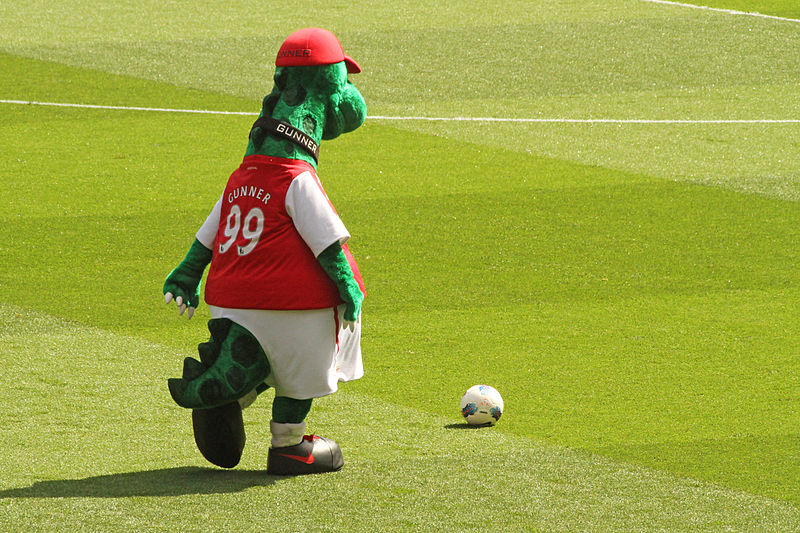Bad news done badly ft. Shell and Arsenal FC

By: Chris Bowman
What do Shell and Arsenal football club have in common?
For one thing, they both face the wrath of an extinction rebellion. In Shell’s case, the network of committed climate change and social justice activists; In Arsenal’s case, the fans and players incandescent about the unceremonious axing of beloved mascot, Gunnersaurus.
But the parallels don’t end there – and Gunnersaurus is more relevant than you might think. They have both recently made remarkably similar comms missteps when announcing job cuts. What lessons can we tenuously draw from them?
Arsenal extinctions
Arsenal first (not in the table, regretfully). On 5th August, the club announced plans to make 55 non-playing staff redundant due to the coronavirus pandemic’s impact on revenues. This proved controversial, with the head coach and most of the playing staff having agreed to take a 12.5% wage cut in April. They were persuaded to do so, if players are to be believed, in large part because they were under the impression that it would safeguard the jobs of their non-playing colleagues and were unhappy to find this wasn’t the case. To rub salt in the wound, the very next week Arsenal announced the signing of free transfer Willian, whose weekly wage alone is surely well north of £120,000 per week.
Fans and commentators were rightly incensed. A lot of PR efforts had been expended painting Arsenal as a family club and these actions seemed to contradict that. It was galling to be told that the club couldn’t afford the wages of the 55 non-playing staff – which have estimated to average £35,000 per year, only to then immediately be told the club could in fact sign an ageing player who earns nearly four times that figure every week.
However, in and among the ire there was also a decent degree of understanding across the fanbase that these are “unprecedented times” and that the pandemic represented an enormous hit to revenues at a club that always tried to only spend what it earns.
Whatever was left of that goodwill evaporated though, when sources in the club revealed that many of the job cuts were actually part of wider restructure on how the club was run and handled recruitment. The suggestion was that this had always been the model technical director Edu wanted to implement, and that COVID-19 merely gave him a convenient excuse to swing the axe.
And then, of course, came the fateful day shortly after where beloved mascot of over 25 years, Gunnersaurus, also faced a cost-cutting extinction event.
So, which was it? Were the job cuts a sad but necessary consequence of the pandemic? Or were they casualties of a long-sought restructure, necessary for the club’s future?
Shelling out
On the face of it, the international oil and gas supermajor Shell could hardly be more different to a Premier League Football Club – especially as Arsenal are one of the few top teams not running on petrodollars (cough, Man City, cough, Chelsea). However, there were some striking parallels with how it announced 9,000 global job cuts in September.
Like Arsenal, the company seemed to put out mixed messages on whether the cuts were driven by the virus, or by pre-existing organisational strategy.
Chief executive Ben van Beurden said: “It is very painful to know that you will end up saying goodbye to quite a few good people. […]But we are doing this because we have to, because it is the right thing to do for the future of the company,” before going on to discuss the firm’s pivot to a net-zero energy business and how that meant the firm would have to change the products it sold. Reading between the lines, it’s hard to miss the inference that job cuts in oil and gas were always going to be on the table.
So we can ask again: which is it? Were the job cuts a sad but necessary consequence of the pandemic? Or were they casualties of a long-sought restructure, necessary for the energy company’s future?
Muddied waters
There is no easy or right way to announce job cuts. They entail families losing their livelihoods, lives upended and considerable hardship. However, at a time when no one is going to respond positively to the message, the best thing a company can do to protect its reputation is to communicate with honesty and integrity.
People can understand that the economic fallout of the pandemic can lead to job cuts. They can also understand that organisations sometimes make ruthless strategic pivots in how they operate – even if they don’t like either explanation. But by switching between the two explanations, or messily mixing up the two, the brand risks losing credibility. From the audience’s perspective, two half-truths add up to one whole lie – and no one likes being lied to.
No doubt both Arsenal and Shell have found themselves having to make unenviable decisions of late, and it’s easy to criticise from the sidelines and with hindsight. But it’s always best to deliver bad news straight: with integrity, clarity and honesty. Anything else is a disservice to the audience and an insult to their intelligence. Salt in the wound indeed.

